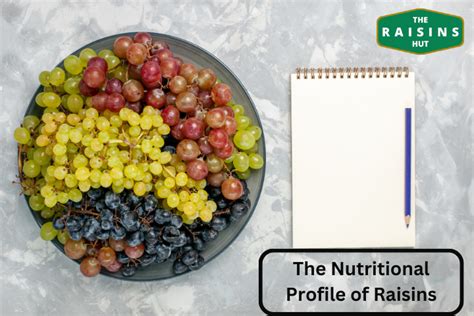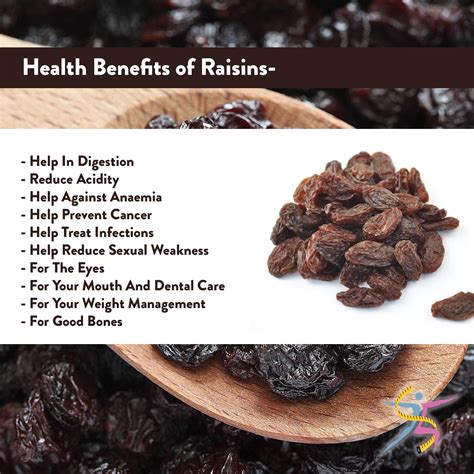Intro
Discover the nutritional benefits of raisins, a sweet and healthy snack rich in fiber, antioxidants, and minerals, promoting digestive health and energy boosts, while exploring their potential drawbacks and recommended consumption.
Raisins have been a staple in many cuisines around the world for centuries, and their popularity endures due to their sweet taste, versatility, and perceived health benefits. However, the question of whether raisins are truly healthy is a complex one, with opinions varying depending on factors such as dietary needs, nutritional goals, and the context in which they are consumed. Understanding the nutritional profile of raisins, their potential benefits, and drawbacks is essential for making informed decisions about their place in a healthy diet.
The importance of evaluating the healthiness of raisins lies in their widespread consumption and their potential impact on overall health. Raisins are dried grapes, and like many dried fruits, they are concentrated sources of natural sugars, fiber, and various micronutrients. Their small size belies their nutritional density, making them a snack that can significantly contribute to daily intake of certain vitamins and minerals. However, their high sugar content and potential for contributing to calorie intake must also be considered, particularly in the context of rising concerns about obesity, diabetes, and other diet-related health issues.
As consumers become more health-conscious and seek out foods that not only taste good but also provide nutritional benefits, the scrutiny of foods like raisins increases. It's not just about whether raisins are healthy or not; it's about understanding how they fit into a balanced diet and how their consumption can be maximized for nutritional gain while minimizing potential drawbacks. This involves looking at the scientific evidence regarding raisins' impact on health, considering the broader dietary context, and making informed choices based on individual needs and goals.
Introduction to Raisins

Raisins are made from grapes that have been dried, either naturally by the sun or through a food dehydration process. The drying process concentrates the sugars and other nutrients, making raisins a sweet and chewy snack. They are a good source of fiber, which can help support healthy digestion and bowel function. Raisins also contain antioxidants and various minerals like copper, iron, and potassium, which play crucial roles in maintaining good health.
Nutritional Benefits of Raisins
The nutritional benefits of raisins are multifaceted. They offer a natural source of energy due to their high carbohydrate content, which can be particularly beneficial for athletes or individuals engaging in strenuous physical activity. The fiber in raisins can help lower cholesterol levels and regulate blood sugar levels, contributing to heart health and diabetes management. Additionally, raisins contain phytochemicals that have been linked to anti-inflammatory properties, which may help protect against chronic diseases.Nutritional Profile of Raisins

To understand the health implications of consuming raisins, it's essential to look at their nutritional profile. A single serving of raisins (about 1/4 cup or 60 grams) contains approximately 130 calories, with the majority coming from carbohydrates. They are also a good source of dietary fiber, containing about 2 grams per serving. Raisins are rich in natural sugars but contain very little fat and protein. In terms of vitamins and minerals, raisins are a good source of potassium, copper, and iron, among others.
Potential Health Benefits of Raisins
The potential health benefits of raisins are significant and varied. They can support healthy digestion due to their fiber content, which can help prevent constipation and promote regular bowel movements. The antioxidants in raisins can help protect against cell damage and reduce the risk of chronic diseases such as heart disease and cancer. Raisins have also been suggested to support bone health, due to their boron content, which is important for maintaining bone density and preventing osteoporosis.Health Considerations and Risks

While raisins offer several health benefits, there are also considerations and potential risks associated with their consumption. One of the primary concerns is their high sugar content, which can be detrimental to dental health and contribute to the development of conditions like obesity and type 2 diabetes when consumed in excess. Additionally, raisins are high in calories, which can be a concern for individuals trying to manage their weight. It's also worth noting that some raisins may be treated with sulfites to extend their shelf life, which can be problematic for individuals with sulfite sensitivities.
Practical Tips for Incorporating Raisins into a Healthy Diet
Incorporating raisins into a healthy diet requires balance and moderation. Here are some practical tips: - **Consume in moderation**: Due to their high sugar and calorie content, it's essential to limit daily intake. - **Choose unsweetened and unsulfured options**: Opt for raisins that are free from added sugars and sulfites. - **Pair with other foods**: Combining raisins with nuts, seeds, or other fruits can create a satisfying snack that offers a balance of nutrients. - **Use in recipes**: Raisins can add natural sweetness and texture to oatmeal, yogurt, salads, and baked goods, reducing the need for refined sugars.Conclusion and Future Directions

In conclusion, raisins can be a healthy addition to a balanced diet when consumed in moderation. Their nutritional benefits, including high fiber and antioxidant content, can support digestive health, heart health, and potentially reduce the risk of chronic diseases. However, their high sugar content necessitates mindful consumption, especially for individuals with specific dietary needs or restrictions. As research continues to uncover the health benefits and potential drawbacks of raisins, staying informed and making conscious choices about their consumption will be key to maximizing their nutritional value.
Final Thoughts
Raisins are a versatile and nutritious food that can contribute to a healthy diet when consumed thoughtfully. By understanding their nutritional profile, potential benefits, and considerations, individuals can make informed decisions about how to incorporate raisins into their eating habits. Whether enjoyed as a snack, used in cooking, or added to favorite recipes, raisins offer a sweet and healthy way to support overall well-being.Are raisins good for weight loss?
+Raisins can be part of a weight loss diet due to their fiber content, which can help with feeling full and supporting healthy digestion. However, their high calorie content means they should be consumed in moderation.
Can raisins help lower cholesterol?
+Yes, the soluble fiber in raisins can help lower cholesterol levels by binding to bile acids and removing them from the body, which in turn can help reduce the amount of cholesterol produced in the liver.
Are raisins suitable for individuals with diabetes?
+Raisins are high in natural sugars, which can affect blood sugar levels. However, in moderation, they can be part of a diabetes diet, especially if paired with foods that have a lower glycemic index to balance out the meal.
We hope this comprehensive guide to raisins has provided valuable insights into their health benefits, nutritional profile, and how they can be incorporated into a healthy diet. Whether you're a long-time fan of raisins or just discovering their potential, we invite you to share your thoughts, experiences, and favorite ways to enjoy raisins in the comments below. Join the conversation and let's explore the wonderful world of raisins together!
